6 More Games Like Cards Against Humanity
Posted by Chris Lesinski on January 09, 2017. 10 Comments
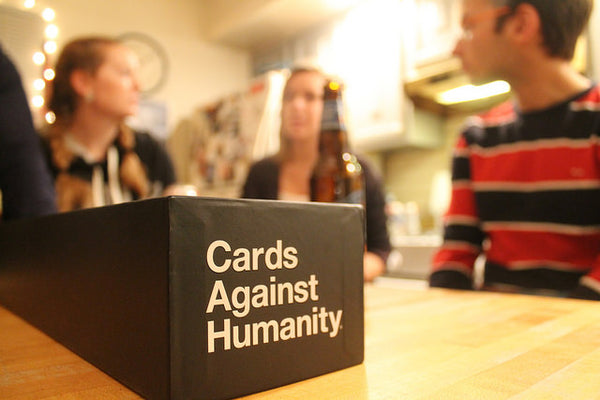
Cards Against Humanity is and was a smash hit for college folks and the party crowd, a behemoth among tabletop franchises, and the main reason your mother no longer comes over to play board games.
Thing is, while CAH itself is a great game and a good introductory experience for new gamers, most new players often transition straight from making hilariously offensive joke stories about celebrities to scratching their heads about resource management statistics or arguing with game store owners for their money back on a really bad indie game. The world of tabletop gaming is a vast wilderness for the uninitiated, which is why we grace your homes with our own game for Cards Against Humanity fans. It’s Deck Around and it’s available here:
That being said, there are 5 more games that are a great stepping off point for someone who wants a game like Cards Against Humanity and isn't sure what to try next. The first three games are relatively light and casual, while the last two are more "hardcore" and are good for more experienced gamers who want to dive head first into the glory that is gaming without having to plug something in. Consider it preparation for the apocalypse!
(Looking for even more hilarious party games? Here are 4 more games like Cards Against Humanity in part 1.)
First off, we have...
#1: Dixit
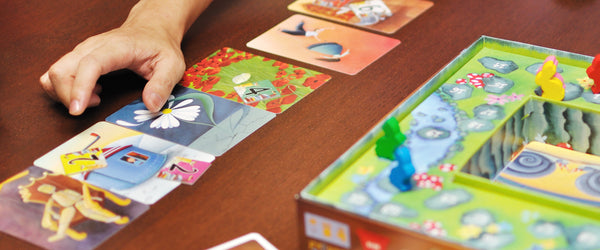
Unlike most games, including Cards Against Humanity, Dixit is much more of a visual game. Like CAH, you basically have one person draw cards, and the game itself revolves around making a story. One player draws several cards, tells a single sentence involving one of them, and then lets the other players guess after revealing the pictures on the card. Both the storyteller and the guessing player get the most points by having the right card being guessed, and the key to winning is to not only choose what makes sense to you, but predict the kind of decisions the storyteller would make based on the impressions he or she would probably get.
Sound familiar? It should. Similar to Cards Against Humanity, key components of the game include:
- Knowing the other players better then they know themselves.
- Understanding how pictures (rather then words) make an impression on people.
- Being creative with your guess work.
- Having just as much fun playing the game as you would winning it.
While we’d still call this a game like Cards Against Humanity, Dixit is more about visual impressions to what can often be described as abstract artwork on oversized cards. Visual artists and Graphic Design majors will love this game, and the content is interesting and less “adult” while still maintaining a bit of mature nuance. This is definitely a good lateral step from the raunchy and often juvenile humor that Cards Against Humanity offers.
Next Up:
#2: Wits and Wagers
Another family-oriented game that is similar, Wits and Wagers is essentially a Trivial Pursuit style game that gives the players some leeway in their approach to answering. When a card is drawn, players don't just try to guess the right answer, like they would in more traditional trivia-based games. As the name implies, the game allows players to "bet" on guesses to the rather than simply having to choose the correct one. No real money is used of course, and you can just as easily bet on someone else's guess as you can on your own. You can even win chips by being the closest person to the correct answer.
Wits and Wagers is similar to Cards Against Humanity for the following reasons;
- Answers are more of a gut feeling then a logical calculation or expert factoid.
- A kind of political voting is involved, in the sense that each bet is a kind of "vote" for a guessed answer.
- The strategies involved require that you know your friends and family better than they know themselves.
- Cards are being used. What? It is called Cards Against Humanity, right?!
Similar to Dixit before it, I bet that even with the game mechanics generously borrowed from a Vegas casino (and its artwork taken from the same hotel room). Your grandmother would only smile as you and your friends bet $100 on what the capitol of Utah is. Hint-hint; its Salt Lake City.
All bets are closed! Now let's take a look at...
#3: Telestrations
Question; what do you get when you cross Pictionary with the game telephone? Obvious, right? This game basically has you draw a picture of a secret word in 90 seconds and then pass it to your neighbor. Points are given to the best artists as well as the best guessers. This picture sums it up quite nicely:
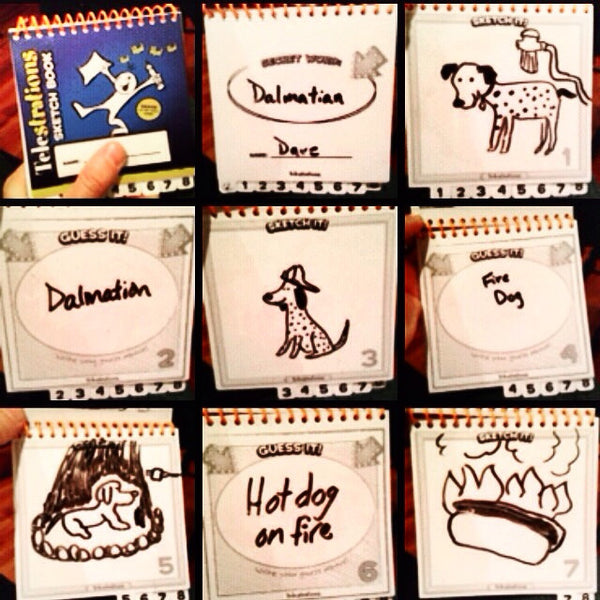
This game is like Cards Against Humanity because it requires:
- Understanding your fellow players better then they know themselves. (Yes this again; It's a common theme here.)
- Impressing said players with your talent at expression (this time, it's your drawing prowess rather than your sense of humor.)
- Cards (Once again, shut up!)
- Communicating ideas that make sense (And you don't get stuck with bad cards here!)
- And you get the chance to enjoy the game without actively "winning"
This is another game dedicated more to the visual thinkers than anyone else. Players with real drawing talent and/or experience will more then likely dominate matches, as will the players who have mastered deduction games like Pictionary or charades. Still, Telestrations is certainly more family friendly — though it can get into adult game territory with the right group. It’s a great Cards Against Humanity alternative for those of you who like getting inside peoples heads.
Pencils down, everyone, now we look deep into the world of...
#4: Mysterium
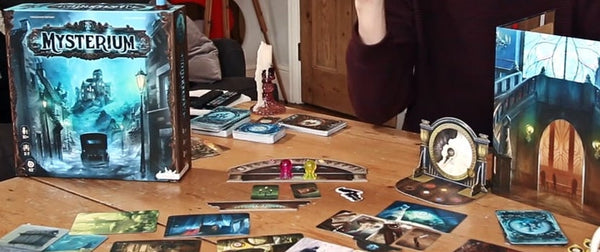
This was made by the same company that produced Dixit, and boy does it show. Unlike Dixit or Cards Against Humanity, Mysterium borrows a lot of its central mechanics from mystery games like Clue. In the same vein, the game's narrative revolves around a murder mystery and the people trying to solve them. The twist is that the investigators are mediums, and they have to solve the mystery with a 7 hour seance using "visions" that they receive from the murder victim's ghost. These come in the form of cards that are exactly like the ones in Dixit.
One player plays as the phantom and hands out these picture cards from behind a Game Master's Screen. The other players, who act as the investigating mediums, have to figure out whodunnit, where, and with what using only the visions the ghost player provides with cards. It's very similar to Clue in this regard, but with significantly less guesswork, as the murder victim is always dropping hints.
This game is a good alternative to Cards Against Humanity for the following reasons:
- It's like Dixit, and holds the same similarities
- It depends on knowing the players around you more than just figuring out whodunnit
- It's better to play in a large group or party setting
- It's not really about winning -- you only win cooperatively as a group so the emphasis is on a good time
Like I said earlier, this game is a lot like Clue in the sense that you are basically solving a murder mystery with pawns and cards. If you are into that sort of thing, and you hate how Clue literally leaves you guessing, this game is right up you alley.
However, unlike said game, the key element is much less trial and error and much more having a competent ghost who knows the rules and players who are good at interpreting visual messages. The downside of this is that you need to have at least one player who really knows the game to play smoothly, and you need a certain amount of luck drawing cards, as some visions are much more vague than others.
This leaves most of the players at the mercy of whoever is teaching them. This can be great for someone who is trying to learn more "hardcore" games, but if the owner of the game doesn't do his or her homework, it can be a really slow and/or painful gaming experience for everyone. So word of advice to the ghastly and murdered: read those instructions!
Okay, let's put away our crystal balls and kick down the door to reveal...
#5: Munchkin
Yes, Munchkin. If you have been playing games long enough, you either love it or hate it. To those of you who haven't had the pleasure of such an experience, understand that it is basically a simplistic, toned down, and humorous card game version of the role playing game Dungeons and Dragons. It's basically a game where you explore medieval dungeons, kill monsters, find treasure, and reach higher levels of power. Often in that exact order.
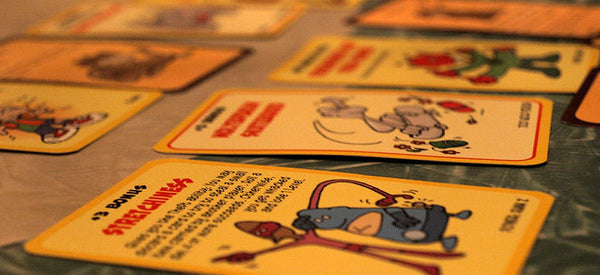
The card game Munchkin distills the well-worn "dungeon-crawler" experience into two decks of cards. One more or less represents the dungeon, and the other represents the loot gathered by the adventuring players. Dungeon cards include monsters, curses, classes and races (for dressing up and empowering your character) and special event cards that can either make your life easier or someone else's time miserable. Loot cards are always a good reward, and usually an item of some sort. Such things come in the form of weapons, armor, potions, magical objects, and the occasional free level of power.
It also has the following things that Cards Against Humanity fans will enjoy:
- Humor bordering on edgy -- while not as much of an NSFW adult card game as CAH, there is definitely tidbits of raunchy laughs, and plenty of subversive nerd jokes on most of the cards
- Cooperative as well as competitive play; it takes both to game, you know!
- Yes. It has cards. A lot of good games have cards!
- It encourages strategy as well as bargaining skills
- Experienced gamers who host parties are likely VERY familiar with it
- It's a great game to play between much more serious, intense games during a game night
The only real catch with this game is that it becomes very political. In fact, I would recommend that this doesn't become the first game you play after CAH. Instead let it be you second or third or fourth. The first Munchkin game is very much a baptism of fire, but it can be fun to play and acts as a great door to gaming culture in general.
Surprise! We also have...
#6: Deck Around
This review wouldn’t be complete without Deck Around, right? While this is otherwise an objective review, the reality is that Deck Around is a great game, one with mechanics you’d look for in a Cards Against Humanity alternative, and the one game that helps power reviews and blog posts like this one.
All you have to do in the game is pick a card, define the word on that card any way you want, and fool someone into thinking your definition is the right definition. That's it. Takes about 27 seconds to learn and is more fun than a barrel of monkeys on spring break. Some even say it's actually BETTER then Cards Against Humanity, mostly because:
- It's easy
- It's often cleaner, despite having room for crude humor (it could get worse than Cards Against Humanity depending on how your friends are)
- It's cheaper, especially without CAH expansions
- It's less about impressing the judge than fooling them
- It allows more creativity and a variable sense of humor because the players write their responses
Remember, all games, be they as simple as Deck Around or as complicated as Advanced D&D, the idea is to have fun. Fun does not include making poor choices of games. We hope these recommendations will assist you on your journey into the wonderful world of gaming, and help you make a safe landing into what can be bumpy and expensive territory.
We also would like to thank you very much for reading this article! The best way to keep us blogging and yourself gaming is to buy a copy of Deck Around or at least download the free edition. Just click the link below and have a happy time gaming.
Or don't. You Thief-Munchkin traitor, you.
Looking for more games like Cards Against Humanity? Go read Part 1!

Comments are closed for this article.